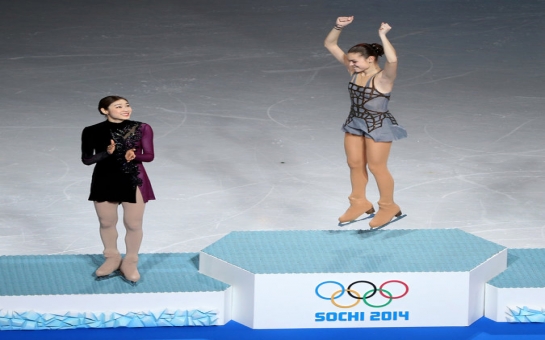“I don’t know, guys,” Browning said, just a few minutes after being oh-so-sure that Kim Yu-na was the winner of the women’s figure skating competition at the Sochi Olympics, and that she easily had beaten Russia’s Adelina Sotnikova.“I just couldn’t see how Yu-na and Sotnikova were so close in the components,” he said. “I was shocked. What, suddenly, she just became a better skater overnight? I don’t know what happened. I’m still trying to figure it out.”Browning and two of his colleagues continued to pore over the judging details, looking at sheets of dozens of numbers representing things like base values and GOEs (that would be grades of execution, of course) and each anonymous judge’s scores.If Browning, a former Olympic figure skater who remains involved with the sport, couldn’t pinpoint why Sotnikova had just pulled off a major upset of the 2010 Olympic champion, how could fans and television viewers be expected to understand what happened?And that is the enduring problem with figure skating. It’s why the sport has dropped in participation and why it’s popular among mainstream fans only every four years. Its scoring system is too convoluted and opaque. Its history, which includes the 2002 Salt Lake Olympics judging scandal, shows that it can be corrupted.One of the judges for Thursday’s women’s competition is married to the general director of the Russian figure skating federation. Another, from Ukraine, was at the center of a voting scandal in ice dancing at the 1998 Nagano Olympics.The skaters, their coaches and the public are not allowed to know how these or any of the other seven judges voted. The sport’s international governing body chooses to keep the individual votes a secret.So the conspiracy theories were immediate and fierce.Sotnikova’s performance was excellent and electric, but many observers seemed to think Kim deserved another gold medal. Some people were just plain confused, and they can’t be blamed.“Yu-na Kim outskated her, but it’s not just a skating competition anymore — it’s math,” Browning said, explaining that Sotnikova racked up little points here and there to move ahead of Kim.The governing body, with its judging ranks tarnished by questionable officials and its scoring system favoring math whizzes over artists, is killing its own sport. But the athletes suffer the most.Ashley Wagner of the United States finished seventh. She said she believed the poor judging tainted the final outcome. In the long program Thursday, she was ranked behind fifth-place Yulia Lipnitskaya, the 15-year-old Russian who was a favorite to win the gold until she stumbled in her short program.In her long program, Lipnitskaya fell on one of her triple jumps. Wagner stayed on her feet, and later blamed the judges for their irregular, inexplicable scoring.“It’s confusing and we need to make it clear for people,” Wagner said of the judging system, which has been in place for about a decade. “I’m speechless. This sport needs to be held accountable if it wants more people to believe in it.”Paul Wylie, the 1992 Olympic silver medalist, said it was a brilliant move for her to realize how crucial it was to win over the crowd. The whole arena heard the cheers and felt the stands shaking as the spectators stamped their feet for her. Surely the judges heard it and felt it, too.“You have human beings pushing the buttons,” Wylie said of the judges, noting that human beings can’t help but be swayed — whether consciously or unconsciously — by a biased audience.He said that figure skaters “learn to live with” that bias, and that they know they might win some but also might lose some.Will spectators live with it, or will they stop watching?(nytimes.com)ANN.Az
Adelina Sotnikova’s Upset Victory Is Hard to Figure
Sport
11:00 | 21.02.2014

Adelina Sotnikova’s Upset Victory Is Hard to Figure
I ran to the first skating insider I could find: Kurt Browning, a four-time world champion who had been commentating for Canadian television. Could he explain what just happened?
Follow us !










